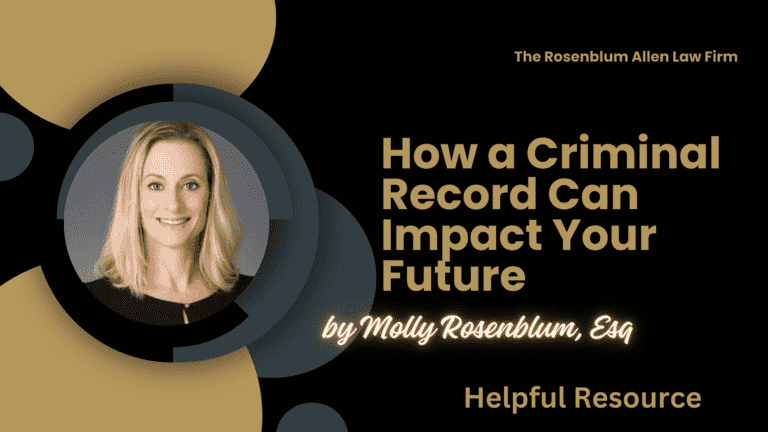The Effects of a Criminal Record on Your Future
A Simple Guide to Understanding the Long-Term Impacts of Having a Criminal Record
You may have heard the saying, “Your past can come back to haunt you.”
This is especially true if you have a criminal record.
A criminal record is a record of a person’s past crimes, which certain people, like employers or landlords, can see.
Let’s talk about how a criminal record can affect your future.

Getting a Job
Many employers will ask if you have a criminal record when you’re looking for a job. This is called a background check. If you do have a criminal record, it might make it harder to get a job. Some employers might not want to hire someone who has committed a crime.
Finding a Place to Live
Just like with jobs, the landlord can check if you have a criminal record when you’re trying to rent a house or apartment. If you do, finding a place to live might be more challenging. Some landlords may not want to rent to someone with a criminal history.
Going to College
A criminal record can also affect your education. Some colleges might ask about your criminal history when you apply. If you have a criminal record, it might make it harder to get into college.
Personal Relationships
Having a criminal record can also impact your relationships. Some people might treat you differently if they know you have a criminal record. It can also make making new friends or starting romantic relationships harder.

More Ways a Criminal Record Can Shape Your Life
Further Details about How a Criminal Record Can Influence Your Future
Let’s dive deeper into how a criminal record can shape your life and what you can do about it.
Voting and Civic Participation
In some places, having a criminal record can affect your right to vote. This is often the case if you’ve been convicted of a serious crime, like a felony. It’s essential to know your rights and check your state’s laws.
Professional Licenses and Certifications
Some jobs require professional licenses or certifications. These include jobs like being a nurse, a teacher, or a real estate agent. If you have a criminal record, it could make it harder to get these licenses or certifications.
Traveling Abroad
A criminal record can also make it harder to travel to other countries. Some countries may not let you in if you’ve been convicted of a specific type of crime. This could limit your vacation options or affect your ability to work or study abroad.

What Can You Do About Your Criminal Record in Nevada?
Expungement and Sealing
In certain situations, you might be able to have your criminal record expunged or sealed. This means that the record would be erased or hidden from most people. Each state has laws about who can get their record expunged or sealed and how they can do it.
Legal Assistance
Having a reasonable defense attorney can make a big difference in your case. They can help you understand your options and fight for your rights. A defense attorney like those at The Rosenblum Allen Law Firm can guide you through the legal process and help you move towards a better future.
Keep Moving Forward
Remember, a criminal record doesn’t have to stop you from living a whole and meaningful life. There are resources and people out there who can help. Don’t be afraid to reach out and seek the support you need. With determination, resilience, and the right legal help, you can overcome the obstacles and create a better tomorrow.
Why You Have Not Hired a Felony Defense Attorney Yet
Watch this short video to take the next big step toward defending your rights against a felony charge.

Breaking It All Down for You
A criminal record can significantly impact many aspects of your life.
It can make it harder to find a job, secure housing, gain admission into college, and even affect personal relationships.
It can also influence your civic participation rights, ability to acquire professional licenses, and ability to travel abroad.
A criminal record can also impact your financial status, reputation, and parental rights.
However, it’s important to remember that a criminal record doesn’t define your future. Options such as record expungement, rehabilitation programs, and character references can help mitigate these challenges.
Legal assistance, like that provided by The Rosenblum Allen Law Firm, can guide you through your options and help protect your rights.
Despite the challenges that a criminal record presents, overcoming these obstacles and creating a better future is possible with the right resources, resilience, and legal support.

Frequently Asked Questions
What is a background check?
A background check involves someone investigating your past, which can include your criminal record, credit history, and work history.
Can all employers see my criminal record?
Not every employer has access to the full details of your criminal record. Some jobs, especially those involving children or vulnerable adults, may require more thorough checks.
Can a criminal record prevent me from obtaining a driver’s license?
Sometimes, a criminal record can affect your ability to obtain or renew a driver’s license, particularly if the crime involved a motor vehicle.
How does a criminal record affect child custody cases?
In child custody cases, the court prioritizes the child’s best interests. A parent’s criminal record, especially for violent or drug-related crimes, could influence the court’s decision.
Do all countries restrict travel for people with criminal records?
The impact of a criminal record on international travel varies by country. Some countries may deny entry, while others may not. It’s essential to check the specific requirements for each country.
What is the difference between record expungement and sealing?
Expungement erases a criminal record as if the conviction never happened. Sealing hides the record from most background checks but can still be accessed in certain situations, such as by law enforcement.
How can I determine if I’m eligible for record expungement or sealing?
Eligibility for record expungement or sealing depends on state laws and individual circumstances. A defense attorney can help you understand your options based on your situation and state regulations.
What are some examples of rehabilitation programs?
Rehabilitation programs can vary widely and may include substance abuse treatment, anger management classes, vocational training, and more.
How can I obtain character references?
Character references are typically written by people who know you well and can speak positively about your character. This could be a teacher, employer, pastor, or family member, depending on the requirements.

Additional Resources for You
Our lead attorney, Molly Rosenblum Allen, Esq., not only brings unparalleled expertise in the courtroom but also provides invaluable resources to help you in your time of need. We would like to remind our readers that alongside her rigorous legal practice, she has created a comprehensive suite of articles to aid in understanding complex legal concepts and procedures. These resources include:
Double Jeopardy: This detailed guide explains the intricacies of Double Jeopardy and its implications in the legal system. Explore more at Double Jeopardy.
Hung Jury: Discover what a Hung Jury means, its consequences in trials, and how it can affect a legal case by visiting Hung Jury.
Circumstantial Evidence: Gain insight into how Circumstantial Evidence is used in legal proceedings and its significance in building a case at Circumstantial Evidence.
Indicted vs Charged: Clarify the differences and legal nuances between being indicted and charged in a criminal case by reading Indicted vs Charged.
Difference Between Jail and Prison: Understand the distinct differences between jail and prison to better navigate the criminal justice system at Difference Between Jail and Prison.
What are Miranda Rights: Learn about the crucial importance of Miranda Rights, when they apply, and how they protect the accused at What are Miranda Rights.
How to Check if You Have an Outstanding Warrant: This essential guide provides a step-by-step process to ascertain if there’s an outstanding warrant against you. Check out How to Check if You Have an Outstanding Warrant.
What to Look for in a Criminal Defense Lawyer: Making the right choice in legal representation is paramount. Discover the key attributes to look for in a defense lawyer at What to Look for in a Criminal Defense Lawyer.
Possible Ways to Reduce a Felony Charge: Explore strategies and legal avenues to potentially reduce the severity of a felony charge at Possible Ways to Reduce a Felony Charge.
Should You Accept a Plea Bargain: Before making any decisions, understand the pros and cons of accepting a plea bargain by visiting Should You Accept a Plea Bargain.
We encourage our readers to leverage these resources for a deeper understanding of the legal landscape and to make informed decisions during challenging times.

Offsite Resources You May Find Helpful
Here are seven offsite resources that can be helpful:
American Civil Liberties Union: The ACLU works in the courts, legislatures, and communities to defend and preserve individual rights and liberties.
The Innocence Project: This non-profit organization works to exonerate the wrongly convicted through DNA testing and reforms in the criminal justice system.
National Association of Criminal Defense Lawyers: NACDL promotes a fair, rational, and humane criminal justice system.
Federal Bureau of Prisons: This federal agency manages and regulates all federal prisons and the inmates within them.
National Legal Aid & Defender Association: NLADA champions effective legal assistance for people who cannot afford legal counsel.
Lawyer Legion: An online platform where you can find a comprehensive directory of lawyers categorized based on specialty and location.
The Sentencing Project: An organization working for a fair and effective U.S. justice system by promoting reforms in sentencing policy, addressing unjust racial disparities and practices, and advocating for alternatives to incarceration.

A Special Message From Our Lead Attorney

Molly Rosenblum, Esq
Dear Reader,
Thank you for taking the time to explore the resources on the impact of a criminal record. I understand that confronting these challenges can be overwhelming, but please remember you don’t have to do it alone.
At The Rosenblum Allen Law Firm, we’re here to guide you through every step of the way. Whether you’re facing a misdemeanor, felony, or a nuanced case, each situation deserves careful consideration, compassion, and a robust defense strategy.
If you feel ready to take the next step or have further questions, I invite you to schedule a free consultation. Please call us directly at (702) 433-2889. We’re here to listen, support, and work towards the best possible outcome for your case.
Thank you once again for your time. I look forward to the opportunity to assist you.
Best Regards,
Molly Rosenblum, Esq.
The Rosenblum Allen Law Firm



